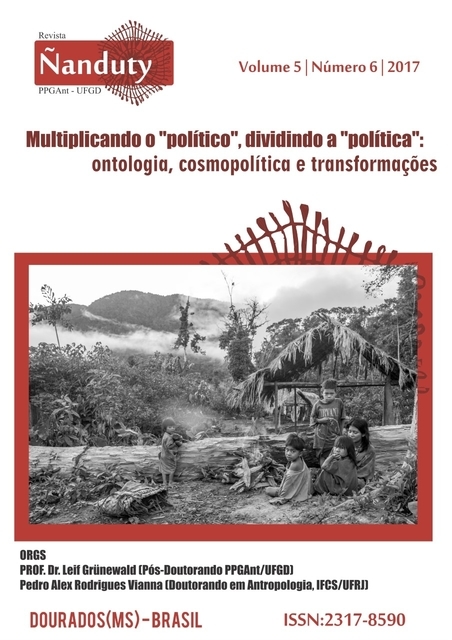Revealing social spaces: comparison and modes of relating in lowland Peru
DOI:
https://doi.org/10.30612/nty.v5i6.6877Keywords:
Amawaka. Peru. Comunidade Nativa. Comparação.Abstract
In this paper, I examine different kinds of collective activities with a specific emphasis on work and its outcomes. The movement of the argument comes from an external comparison made by native community president, Manuel Sarasara, inwards to a comparison of different activities within the Native Community. I believe that the Native Community as a social, economic and political institution offers substantial comparative value for thinking through the ways in which Amawaka people have become good Peruvian Citizens and that the Native Community might be understood as integral for the construction of the nation-state. Additionally, I am specifically interested in what makes one kind of collective activity different from another, and how effort, or work, might be understood as being significant for what it means to be a community in a sense that defies a distinction between modern and traditional.Downloads
Download data is not yet available.
Downloads
Published
2017-09-20
How to Cite
Hewlett, C. (2017). Revealing social spaces: comparison and modes of relating in lowland Peru. Revista Ñanduty, 5(6), 119–145. https://doi.org/10.30612/nty.v5i6.6877
Issue
Section
Artigos do Dossiê
License
Autores que publicam nesta revista concordam com os seguintes termos:
- Autores mantém os direitos autorais e concedem à revista o direito de primeira publicação, com o trabalho simultaneamente licenciado sob a Creative Commons Atribuição-NãoComercial-CompartilhaIgual 3.0 Brasil que permitindo o compartilhamento do trabalho com reconhecimento da autoria do trabalho e publicação inicial nesta revista.
- Autores têm autorização para assumir contratos adicionais separadamente, para distribuição não-exclusiva da versão do trabalho publicada nesta revista (ex.: publicar em repositório institucional ou como capítulo de livro), com reconhecimento de autoria e publicação inicial nesta revista.
- Autores têm permissão e são estimulados a publicar e distribuir seu trabalho online (ex.: em repositórios institucionais ou na sua página pessoal) a qualquer ponto antes ou durante o processo editorial, já que isso pode gerar alterações produtivas, bem como aumentar o impacto e a citação do trabalho publicado (Veja O Efeito do Acesso Livre).


